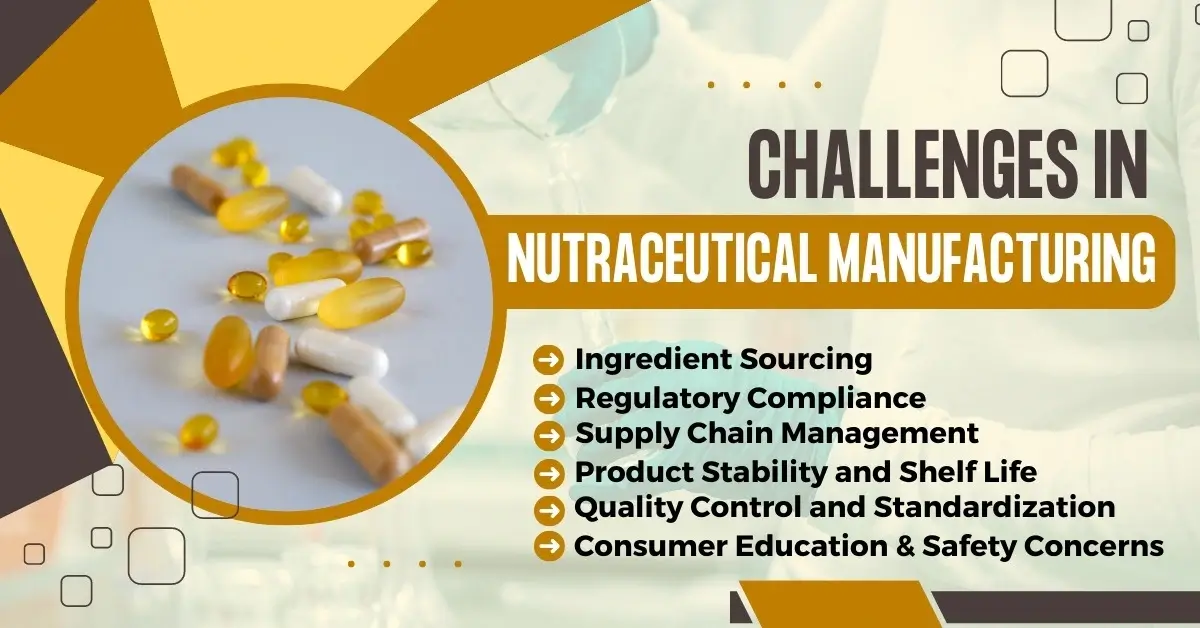Top 5 Challenges in Nutraceutical Manufacturing: The nutraceutical industry has experienced tremendous growth over the past decade, with an increasing number of consumers seeking natural supplements and health-enhancing products. Nutraceutical manufacturing involves the production of dietary supplements, functional foods, and herbal products that offer potential health benefits. However, as this industry expands, it faces numerous challenges that can hinder production efficiency, product quality, and regulatory compliance. In this blog post, we will explore some of the significant challenges faced by nutraceutical manufacturers and discuss strategies to overcome them.
1. Quality Control and Standardization
One of the most critical challenges in nutraceutical manufacturing is ensuring consistent product quality and standardization. Unlike pharmaceuticals, which are subject to stringent regulatory requirements, nutraceuticals often lack well-defined quality control standards. The presence of natural ingredients with varying compositions and potencies can lead to batch-to-batch variations. This inconsistency can compromise the product’s effectiveness and erode consumer trust.
Overcoming Strategy: Implementing robust quality control processes, including raw material testing, regular product sampling, and quality assurance protocols, is essential. Manufacturers should establish specifications for active ingredients, purity, and potency to ensure uniformity in their products. Collaborating with reputable suppliers and adhering to industry standards can also enhance product standardization.
2. Regulatory Compliance
The nutraceutical industry operates in a complex regulatory landscape, where rules and requirements may vary depending on the region and the type of product being manufactured. Navigating through the ever-changing regulations and ensuring compliance with safety, labeling, and marketing guidelines can be daunting for manufacturers. Failure to meet these regulations may result in recalls, fines, or legal repercussions.
Overcoming Strategy: Manufacturers must stay up-to-date with the latest regulations and guidelines in each market they serve. Partnering with regulatory consultants and engaging in proactive communication with relevant authorities can help manufacturers maintain compliance. Investing in good manufacturing practices (GMP) and conducting thorough internal audits will ensure adherence to quality and safety standards.
3. Ingredient Sourcing and Supply Chain Management
The availability and consistency of raw materials are critical factors in nutraceutical manufacturing. Sourcing high-quality ingredients from reliable suppliers can be challenging, especially if certain components are scarce or come from geographically limited regions. Moreover, disruptions in the supply chain, such as natural disasters or geopolitical tensions, can lead to delays and increased costs.
Overcoming Strategy: Diversifying the supplier base and establishing long-term partnerships with reputable vendors can mitigate the risks associated with ingredient sourcing. Manufacturers can also invest in vertical integration by cultivating their raw materials or conducting in-depth assessments of their suppliers’ capabilities. Building a resilient supply chain and maintaining buffer stocks can help offset potential disruptions.
4. Product Stability and Shelf Life
Many nutraceutical products contain sensitive ingredients that can degrade over time or when exposed to adverse environmental conditions, such as temperature and humidity fluctuations. Ensuring product stability and extending shelf life is essential to maintain the efficacy of the nutraceuticals.
Overcoming Strategy: Manufacturers can employ advanced packaging technologies that provide better protection against external factors. Conducting stability studies to determine the shelf life of products under different storage conditions is crucial. Additionally, investing in research and development to formulate more stable product variants can improve shelf life and customer satisfaction.
5. Consumer Education and Safety Concerns
As the nutraceutical industry continues to grow, so does the need for consumer education. Many consumers are unaware of potential interactions between nutraceuticals and prescription medications or the recommended dosage for specific products. This lack of awareness can lead to improper usage and potential safety issues.
Overcoming Strategy: Nutraceutical manufacturers should prioritize consumer education by providing clear and concise product information, including proper usage guidelines, potential side effects, and contraindications. Labels should be easy to understand, and manufacturers can offer educational resources on their websites or through partnerships with healthcare professionals.
Conclusion
The nutraceutical manufacturing industry holds vast potential for promoting overall health and wellness. However, to capitalize on this potential, manufacturers must address the challenges outlined in this blog post. By focusing on quality control, regulatory compliance, supply chain management, product stability, and consumer education, nutraceutical companies can create reliable and effective products while fostering trust and loyalty among consumers. Overcoming these challenges will not only ensure the success of individual businesses but also contribute to the growth and sustainability of the entire nutraceutical industry.

